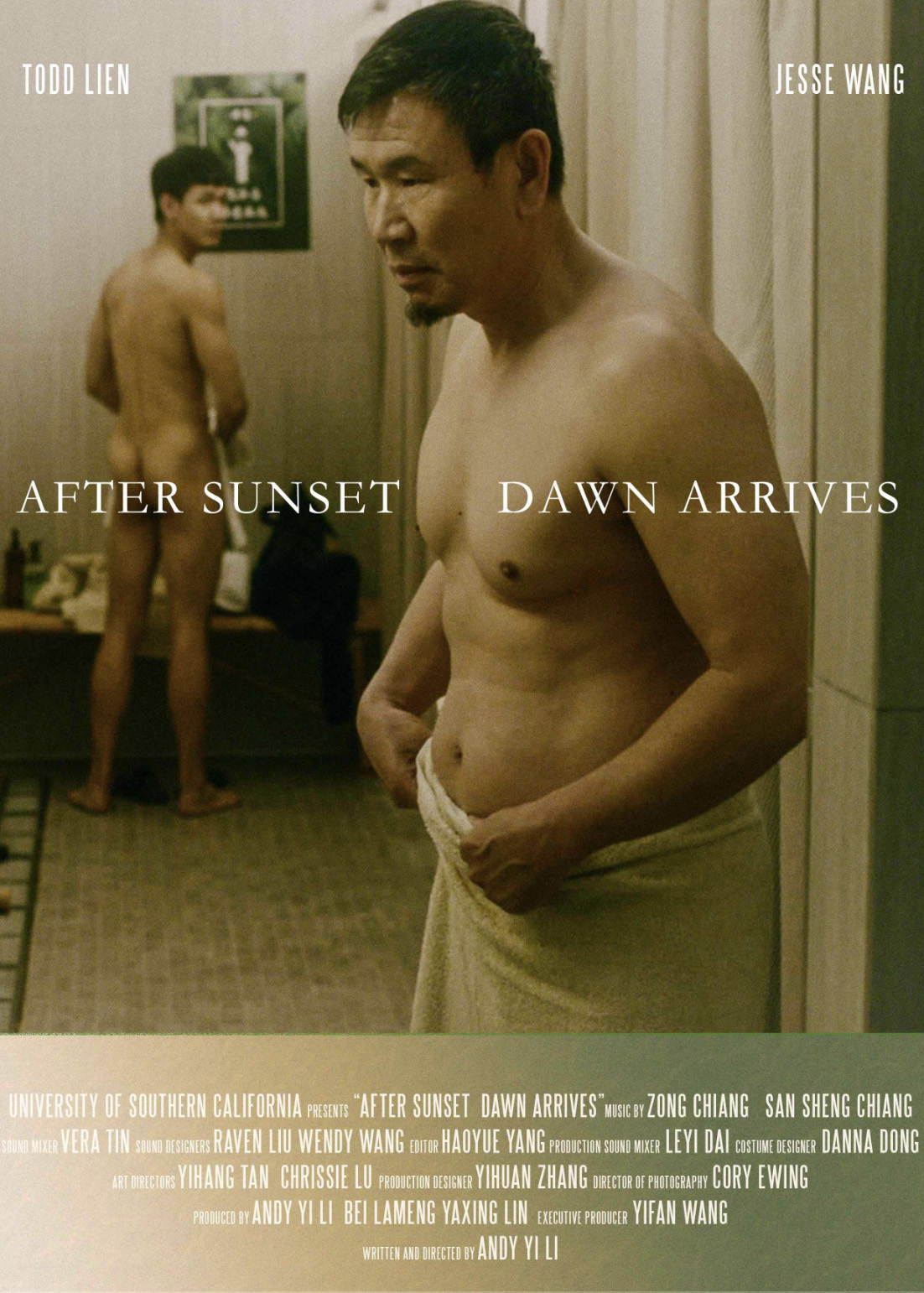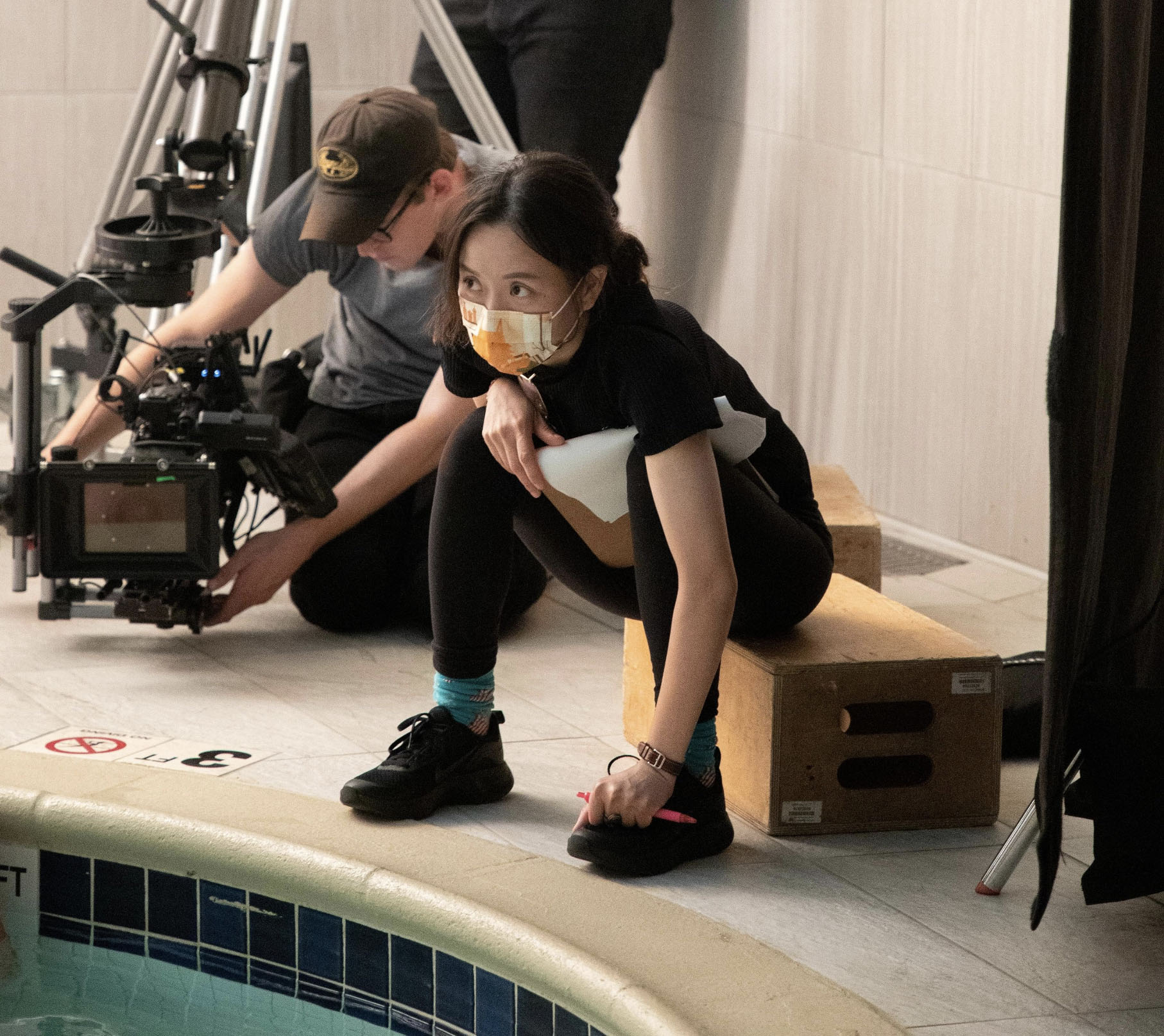What inspired you to tell the story of an older gay man’s journey of self-discovery in “After Sunset, Dawn Arrives”?
In 2017, the loss of a loved family member made me to reflect on life’s missed opportunities, prompting a film that delves into self-acceptance and the burdens of grief. My own exploration of sexuality and commitment to representing the marginalized inspired me to focus on the elderly and the seldom-seen tenderness among elderly men. ‘After Sunset, Dawn Arrives’ sets this narrative in a ballroom reminiscent of Shanghai’s ‘Lai Lai Ballroom,’ a sanctuary for older gay men, reimagined in early 2000s Los Angeles. The film is my tribute to those find solace and self-acceptance in declining years
How did a personal tragedy influence the narrative of your award-winning short film?
As a filmmaker, my artistic inspiration is deeply intertwined with my own life experiences. The narrative of my film was profoundly shaped by the loss of a loved one, which brought the themes of mortality, unfulfilled dreams, and the quest for self-realization into sharp focus. It compelled me to weave a story that not only navigates the intricacies of grief but also celebrates the courage it takes to confront and overcome the constraints that life and society often impose. This tragedy instilled a sense of urgency and authenticity in the film, as it reflects the journey of reconciling with loss and finding a path to self-acceptance.
In exploring themes of self-acceptance and grief, what message did you hope to convey to your audience?
I wish after watching my film, audiences can have a better understanding of who they really love and what they really want to do for their lives. It is never too late to change.
Winning at the Athens International Film + Video Festival must have been a significant achievement.
Can you share your experience and how it felt to be recognized among over 2000 entries?
Winning at the Athens International Film + Video Festival, known for championing cinema from underground and marginalized populations, was a deeply gratifying experience. The award made me more sure of myself and excited to keep making films that matter.
Your film has been praised for addressing the nuanced emotions of men and the scarcity of stories about Chinese gay men in cinema. Why do you think such narratives are important?
Narratives like those in my film are crucial because they bring diversity and depth to the stories we see in cinema. By addressing the nuanced emotions of men, particularly Chinese gay men whose experiences are rarely depicted on screen, the film challenges stereotypes and expands our understanding of masculinity and identity.

Casting the right actor for Wan must have been challenging. How did you approach this process, and what qualities were you looking for?
We enlisted a casting director who understood the vision and essence of the character. Together, we used every resource available to us, tapping into networks, holding auditions, and searching through a diverse pool of talent. We were looking for an actor with a nuanced understanding of the role, someone who could naturally portray a character who is outwardly reserved yet internally complex. The believability of the actor’s performance was non-negotiable; it was the linchpin of the film’s emotional authenticity. After an exhaustive search, we were lucky to find Jesse Wang, who brought Wan to life with the exact mix of subtlety, depth, and realism we envisioned.
“After Sunset, Dawn Arrives” has received a lot of industry buzz and accolades.
How do you feel about the film’s reception and its impact on audiences and critics alike?
The positive industry buzz and accolades for “After Sunset, Dawn Arrives” have been truly humbling. I am thrilled to see that the tenderness of the film and the values it aims to convey have resonated with many. The fact that it appeals to both the general audience and moves film critics alike is incredibly rewarding. It’s a testament to the universal language of emotion that the film speaks, and I am delighted to witness its impact on such a wide spectrum of viewers.
As a filmmaker, you’ve shown a commitment to highlighting marginalized and discriminated individuals. How do you choose the stories you want to tell?
As a filmmaker, my storytelling is deeply influenced by my own experiences. Starting with themes close to my heart, I often explore the lives of marginalized individuals, a group to which I also belong. My journey as a young immigrant, arriving in the United States at 17 and navigating adulthood in a foreign country, has been a firsthand experience of living on the fringes. This diasporic experience has imbued me with a unique perspective that I channel into my films. It’s this personal authenticity that I believe resonates in the stories I choose to tell, whether they reflect the East Asian experience, female narratives, or the myriad challenges faced by immigrants. It’s crucial for me to lend a voice to those stories that are often unheard and bring to light the diverse tapestry of human experiences.
The film is set in the historical Lai Lai Ballroom in Shanghai. Why was this setting significant to the story, and how did it influence the film’s atmosphere?
The Lai Lai Ballroom is a crucial setting in the film, offering a clandestine retreat for elderly gay Chinese men who lack other safe havens. In the film, this hidden gem in Los Angeles’ Chinatown, inspired by the original in Shanghai, creates an atmosphere steeped in secrecy and camaraderie. The ballroom’s dim lights and close quarters foster a sense of shared intimacy, contributing to a mood that’s both poignant and defiant. Its role is essential, offering a stark contrast to the outside world and enveloping the characters in a cocoon of vibrant, yet mysterious, warmth. The atmosphere within these walls is one of the last bastions of expression and connection for its visitors, captured poetically on film through the medium of dance.
With the film qualifying for the Oscars 2024 and receiving numerous awards, how do you view its success in terms of advancing LGBTQ+ narratives in cinema?
The film shines a light on the rarely seen narratives of older East Asian gay men, adding depth and diversity to LGBTQ+ stories on screen. Its success signals a shift towards a more nuanced representation, where the experiences of all ages and cultures within the LGBTQ+ community are valued and explored. This acknowledgement may inspire more stories that reflect the rich tapestry of the LGBTQ+ experience, underscoring the importance of diversity in cinematic storytelling. As a filmmaker, it’s heartening to contribute to this progress and to see such narratives embraced on a global stage.
How did you navigate the challenges of working with a limited budget, and what did you learn from this experience?
Working within the confines of a limited budget taught me that limitations can indeed spark liberation. With a finite amount of time and resources, every minute on set becomes precious. This reality honed my ability to swiftly identify and focus on capturing the most pivotal shots that would drive the story forward. I learned the art of efficient filmmaking – being decisive, prepared, and communicative.
Clear and frequent communication with the crew was essential. It ensured that everyone was aligned with the day’s objectives, which is crucial when time equates to money. As a director, I discovered the importance of being in sync with the creative heads of each department. Ensuring they fully understood the vision and intention behind each scene enabled us to work cohesively and think creatively together. This experience was invaluable, teaching me that a limited budget doesn’t limit the potential of a film but rather invites innovation and unity among the crew.
Your upcoming film “Auntie Wu” aims to pay tribute to the unsung heroes of children’s lives—their nannies. Can you share more about the inspiration behind this project?
“Auntie Wu” is a deeply personal project that draws inspiration from my own life journey. This film serves as a heartfelt tribute to my own auntie, who entered my family’s life when I was just two years old and became my caregiver. Through her unwavering presence and care, she imparted valuable life lessons that I believe are worth sharing through the medium of cinema.
She exemplifies the art of finding meaning and beauty in the seemingly ordinary moments of life. Her ability to infuse each mundane day with purpose and appreciation left a profound impact on me. I haven’t seen her for a few years, the separation has prompted me to reflect on our shared past and the invaluable lessons she instilled in me. It’s a film that celebrates the unsung heroes of children’s lives, the nannies who leave an indelible mark on our formative years.

Transitioning from short films to your debut feature film, what are some of the challenges and excitements you’re facing?
Transitioning from short films to my debut feature film presents both challenge and excitement. With more investors involved, the challenge lies in balancing my creative vision with commercial appeal to ensure financial viability. Additionally, a feature film operates on a much larger scale, necessitating efficient management of a larger crew and collaborators. Effective communication and collaboration become paramount, making it an exciting yet potentially challenging aspect of this transition. Nonetheless, the prospect of reaching a broader audience and sharing a deeply personal story on a grander stage brings immense excitement and new opportunities to the forefront of this journey.
The relationship between Auntie Wu and Tao Tao is central to your upcoming film. How do you plan to explore this dynamic, and what themes will you focus on?
In “Auntie Wu,” the relationship between Auntie Wu and Tao Tao takes center stage, serving as the emotional core of the film. I plan to explore this dynamic by delving into themes such as coming of age, the intergenerational bonds that shape us, women’s empowerment, the enduring nature of love that transcends physical distance, and the richness found in the simplicity of life. Through these interconnected themes, I aim to craft a narrative that resonates deeply with audiences, offering a heartfelt and relatable story that touches on universal experiences.
With an impressive portfolio of work that has garnered international recognition, what are your aspirations for the future, and how do you hope to influence the film industry?
In the future, my aspirations revolve around creating films that go beyond mere entertainment, aiming to inspire audiences to reflect on and cherish life’s intricacies. I intend to continue uncovering untold stories, pushing artistic boundaries with innovative visual language, and exploring fresh storytelling approaches through emerging technology and media platforms. Ultimately, my goal is to carve out a unique niche and identity in the film industry, leaving a distinctive mark as an Asian female filmmaker. By championing diverse narratives and encouraging others to embrace new perspectives in filmmaking, I hope to make a lasting and meaningful contribution to the industry.
To learn more about her professional career, please visit Andy Yi Li IMDb. Read more about the film at After Sunset, Dawn Arrives (Short 2022) IMDb. The film is now streaming on Dekkoo and Amazon Prime Video.
Amazon
https://www.primevideo.com/detail/After-Sunset-Dawn-Arrives/0LCUH3U329TA1FM2MR90JCA7WD
Dekkoo
https://www.dekkoo.com/videos/after-sunset-dawn-arrives
Contact Information
Writer: Sherry Lee, GTK PR
https://www,gtktalentagency.com
email: gtkprtalent@gmail.com









